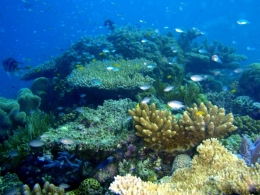13-02-2020
CoralChange: a project to study and protect threatened coral by global change
Coral reefs build one of the most diverse, fascinating and productive ecosystems in the planet. However, these biological structures are also highly sensitive to the adverse effects of the current climate crisis. Phenomena such as progressive bleaching and massive mortality of coral affect the marine ecosystems of the planet and endanger the future of these communities.
In this context, the UB is leading CoralChange, a project that will assess –for the first time- the role of the larval reproduction and ecology in the dynamics and viability on the long term of the threatened coral populations worldwide. To do so, CoralChange counts on the funding from the European Union, and in particular from the Horizon 2020 Marie Skłodowska-Curie action fellowship.
The project, managed by the Bosch i Gimpera Foundation (FBG), is coordinated by the lecturer Cristina Linares, from the Department of Evolutionary Biology, Ecology and Environmental Sciences of the Faculty of Biology and the Biodiversity Research Institute (IRBio) of the University of Barcelona.
Another participant in the study is the expert Núria Viladrich, from the mentioned Department and IRBio, who will analyse, from 2020 to 2022, the global change-induced transgenerational effects in hexacorallia and octocorals in the Caribean, in collaboration with the team of Jacqueline Padilla-Gamiño, assistant professor at the University of Washington (United States).
Protecting corals from the effects of global change
With an innovative perspective, CoralChange will promote the knowledge on the future of coral populations using demographical models applied to different global change scenarios. In this line, researcher Núria Viladrich will work on a series of demographic prediction models –with experimental data and field work– that will include parameters on the physiological condition, trophic plasticity, reproductive success and larval viability of corals.
The project will also consider other aspects about these organisms, such as the additional energy cost of the coral ability to adjust their physiology –that is, acclimation–, and keep the biological activity under environmental change conditions.
The CoralChange approach will enable the identification of potential energy costs of adaptive mechanisms regarding the ocean acidification and warming that can damage the early life stages –the most vulnerable ones- of corals. This energy cost could cause effects on the viability of the future descendants of the coral populations which are now threatened.
The results of the project will be crucial to develop effective management and conservation strategies to protect coral reefs under different factors of environmental stress, as well as to identify the coral populations and species with more chances to survive under the future conditions in the marine environment.
Source:ComunicacióUB
In this context, the UB is leading CoralChange, a project that will assess –for the first time- the role of the larval reproduction and ecology in the dynamics and viability on the long term of the threatened coral populations worldwide. To do so, CoralChange counts on the funding from the European Union, and in particular from the Horizon 2020 Marie Skłodowska-Curie action fellowship.
The project, managed by the Bosch i Gimpera Foundation (FBG), is coordinated by the lecturer Cristina Linares, from the Department of Evolutionary Biology, Ecology and Environmental Sciences of the Faculty of Biology and the Biodiversity Research Institute (IRBio) of the University of Barcelona.
Another participant in the study is the expert Núria Viladrich, from the mentioned Department and IRBio, who will analyse, from 2020 to 2022, the global change-induced transgenerational effects in hexacorallia and octocorals in the Caribean, in collaboration with the team of Jacqueline Padilla-Gamiño, assistant professor at the University of Washington (United States).
Protecting corals from the effects of global change
With an innovative perspective, CoralChange will promote the knowledge on the future of coral populations using demographical models applied to different global change scenarios. In this line, researcher Núria Viladrich will work on a series of demographic prediction models –with experimental data and field work– that will include parameters on the physiological condition, trophic plasticity, reproductive success and larval viability of corals.
The project will also consider other aspects about these organisms, such as the additional energy cost of the coral ability to adjust their physiology –that is, acclimation–, and keep the biological activity under environmental change conditions.
The CoralChange approach will enable the identification of potential energy costs of adaptive mechanisms regarding the ocean acidification and warming that can damage the early life stages –the most vulnerable ones- of corals. This energy cost could cause effects on the viability of the future descendants of the coral populations which are now threatened.
The results of the project will be crucial to develop effective management and conservation strategies to protect coral reefs under different factors of environmental stress, as well as to identify the coral populations and species with more chances to survive under the future conditions in the marine environment.
Source:ComunicacióUB
